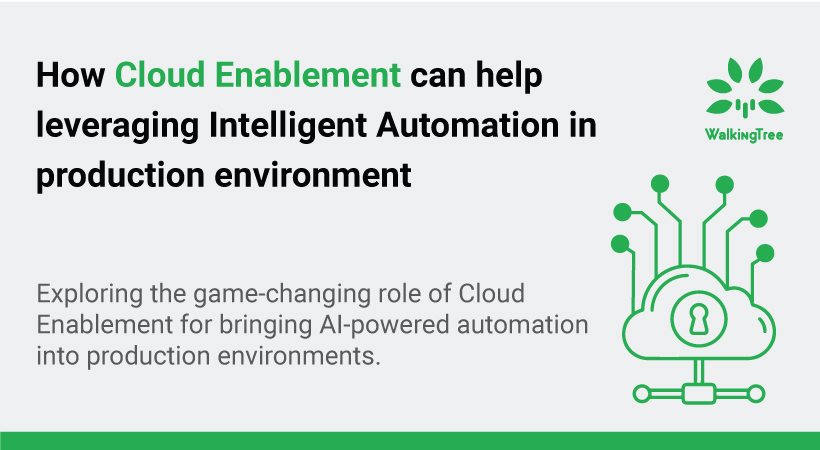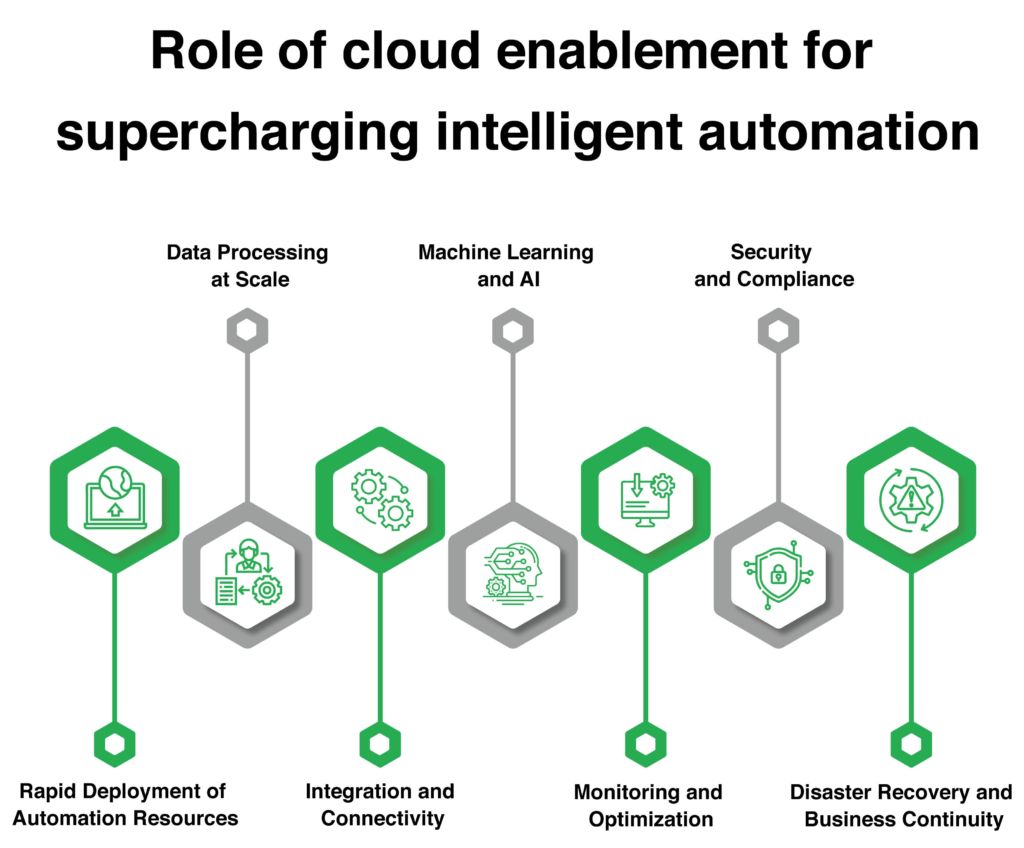
Businesses are constantly seeking ways to improve efficiency, reduce operational costs, and enhance productivity. One strategy that has gained significant traction is the integration of intelligent automation into production environments. But here’s the kicker: if you truly want to supercharge your automation efforts, it’s time to talk about cloud enablement. In this blog post, we’re going to cut straight to the chase and explore how leveraging the cloud can turbocharge your intelligent automation initiatives, all while optimizing your production environment.
|Understanding Intelligent Automation
Before we dive into the nitty-gritty of cloud enablement, let’s get our facts straight on what intelligent automation is and why it’s a game-changer.
Intelligent automation is not just about robots taking over manual tasks. It’s about the fusion of artificial intelligence (AI) and robotic process automation (RPA) to create a digital workforce that can not only perform repetitive tasks at lightning speed but also make decisions, learn from data, and adapt to new scenarios. It’s the future of efficiency and productivity in business operations.
So, how does cloud enablement fit into this equation, and why is it crucial? Let’s explore.
Cloud enablement, in essence, is the process of leveraging cloud computing resources and services to enhance and streamline your operations. It’s not just a trendy buzzword; it’s a strategic move that can revolutionize the way you do business. Here’s why:
- Scalability and Flexibility: Cloud platforms provide unmatched scalability. Whether you’re dealing with a surge in data or increasing automation demands, the cloud can effortlessly accommodate your needs. No need to invest in new physical infrastructure or worry about capacity planning.
- Cost-Efficiency: Traditional IT infrastructure can be costly to maintain. With cloud enablement, you pay only for what you use, avoiding hefty upfront investments. It’s a cost-effective way to fuel your automation endeavors.
- Global Accessibility: The cloud allows your automation tools and data to be accessible from anywhere with an internet connection. This means your automation processes can run smoothly even if your team is distributed across the globe.
- Reliability and Redundancy: Cloud providers boast robust redundancy and failover capabilities. Your automation processes can enjoy unparalleled uptime and data resilience, reducing the risk of interruptions.
- Elastic Computing: Cloud platforms offer on-demand computing resources. This elasticity is perfect for automation tasks that require bursts of processing power, ensuring your operations never lag.
|Understanding the role of cloud enablement for supercharging intelligent automation
Now that we understand the power of cloud enablement, let’s dive into how it can supercharge your intelligent automation efforts in a production environment.
- Rapid Deployment of Automation Resources: In traditional on-premises setups, provisioning new hardware or resources for automation can be a time-consuming and cumbersome process. With cloud enablement, this process becomes remarkably swift. Cloud platforms offer Infrastructure as a Service (IaaS), allowing you to quickly spin up virtual machines, allocate storage, and configure networking with just a few clicks. This agility is a game-changer for intelligent automation in production environments, where the ability to scale resources up or down on demand is crucial for meeting workload fluctuations efficiently.
- Data Processing at Scale: Many intelligent automation tasks involve processing large volumes of data, such as analyzing historical production data for predictive maintenance or handling real-time sensor data. Cloud platforms provide access to high-performance computing resources, including GPUs and TPUs, that can handle massive data sets and complex algorithms with ease. This computational prowess enables faster data processing, which translates into quicker decision-making and more efficient automation workflows.
- Integration and Connectivity: Intelligent automation rarely operates in isolation; it often needs to interact with other systems and services. Cloud ecosystems offer a wide array of integration tools and connectors that facilitate seamless connectivity. Whether you’re integrating with other cloud-based services, leveraging third-party APIs, or bridging the gap with on-premises systems, the cloud provides a versatile and well-supported environment for ensuring your automation workflows can communicate effectively with the broader IT landscape.
- Machine Learning and AI: Machine learning and AI play pivotal roles in intelligent automation. These technologies thrive in the cloud environment due to its abundant computational resources. Cloud platforms offer scalable infrastructure for training and deploying machine learning models, enabling automation processes to leverage advanced capabilities like natural language processing (NLP), image recognition, recommendation engines, and predictive analytics. With the cloud’s horsepower, your automation can harness the full potential of AI to make smarter decisions and deliver more precise results.
- Monitoring and Optimization: Continuous improvement is a cornerstone of automation in production environments. The cloud provides robust monitoring and optimization tools that allow you to keep a close eye on your automation processes. Real-time performance metrics, logs, and alerts help you identify bottlenecks, pinpoint areas for improvement, and fine-tune your workflows. This data-driven approach ensures that your automation operates at peak efficiency, delivering consistent and reliable results.
- Security and Compliance: Security and compliance are paramount concerns in production environments. Cloud providers invest heavily in ensuring the security and compliance of their services. They offer features like encryption at rest and in transit, identity and access management (IAM) controls, compliance certifications (e.g., SOC 2, ISO 27001), and robust auditing capabilities. Leveraging the cloud for automation means you can inherit these security measures, ensuring that your automation processes meet the highest standards for data protection and regulatory compliance.
- Disaster Recovery and Business Continuity: Downtime in production environments can lead to substantial losses. Cloud platforms offer robust disaster recovery (DR) and business continuity solutions. Automated backups, geographically distributed data centers, and failover mechanisms ensure that your automation processes continue running even in the face of unforeseen disruptions. This level of resilience minimizes downtime, safeguards your data, and ensures uninterrupted operation, critical for maintaining productivity and meeting production goals.
|Let cloud solutions make you push towards intelligent automation, early and often
In the race for operational excellence and competitiveness, intelligent automation is no longer a luxury—it’s a necessity. And when you couple it with the power of cloud enablement, you’re not just embracing the future; you’re leading the way.
By harnessing the scalability, flexibility, cost-efficiency, and sheer computational might of the cloud, you supercharge your intelligent automation initiatives. Whether you’re in manufacturing, customer support, e-commerce, or any other industry, cloud-enabled automation is your ticket to increased efficiency, reduced costs, and unprecedented productivity.
The bottom line is simple: the future belongs to those who automate intelligently and leverage the cloud’s boundless capabilities. Don’t just keep up with the times—stay ahead of them.

